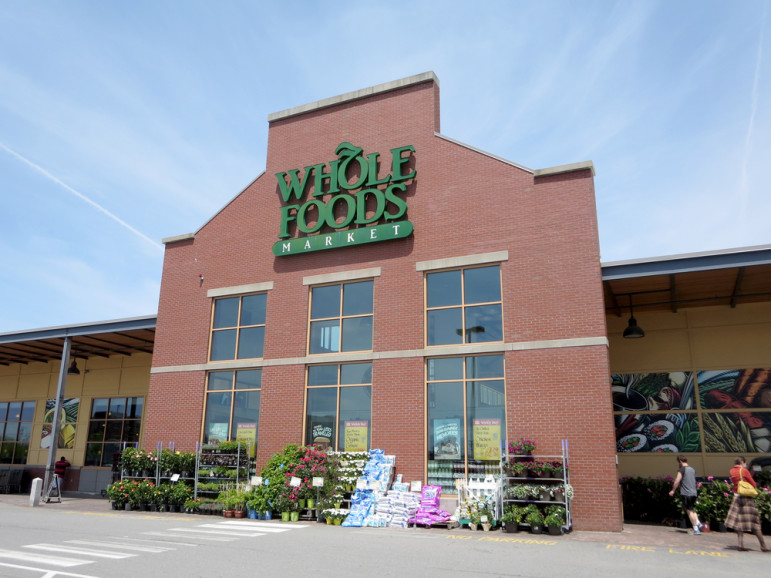
March 8, 2016; NPR, “The Salt”
It started with a Tweet, as it so often does. A photo, to be more precise, that showed Whole Foods selling peeled oranges inside plastic containers.
If only nature would find a way to cover these oranges so we didn’t need to waste so much plastic on them. pic.twitter.com/00YECaHB4D
— Nathalie Gordon (@awlilnatty) March 3, 2016
Apparently, the $5.99-per-pound, pre-peeled oranges are an attempt at cutting down time in the kitchen. The modern consumer on the go revels in the convenience of peeled carrots or bagged greens because of the pain of doing the work oneself. The argument is particularly salient for those with disabilities, for whom prepared and prepackaged foods may be a necessity for daily living. However, activists are pitting the convenience of peeled oranges with the environmental and social costs.
The decision to offer these packaged oranges may seem strange for Whole Foods, given the store banned plastic bags back in 2008. There is a significant amount of waste created when making these sorts of products. Not only is there potential waste from the plastic containers, which may or may not be recyclable or recycled by the consumer, but Whole Foods likely discarded all the orange peels when putting these packages together. The same can be said for peeled carrots or cut broccoli, where the stalks and carrot skins could, for example, be used in a homemade vegetable broth.
This food waste in this country is only compounded when we consider most regular consumers of fruits and vegetables are looking for the best, unblemished product possible, leaving the undesirable food either to rot past when it can be eaten safely or be discarded altogether. While a baker or cook would know that overly ripe, almost-black bananas can be used to make banana bread, your neighborhood grocery store isn’t going to be holding out. NPQ just wrote about a new French law that will require supermarkets to donate soon-to-be discarded food to charities. As noted by Danielle Holly in the article, there seems to be some confusion about sell-by dates, which may indicate the time that is best to eat a certain product, but not when it spoils. This leads supermarkets and consumers to discard food sooner than they need to.
On the account of food waste, Whole Foods is trying to be more conscious of its possible part in the problem. The grocery chains announced last week an initiative to sell “cosmetically challenged” food or other products some consumers don’t want. Whole Foods is partnering with Imperfect Produce to test sales of weird-looking food that is otherwise perfectly okay to eat. Grocery store chain Giant Eagle has already piloted a similar initiative, which has drawn customers because of the discounted prices at which the “ugly” food is sold.
Sign up for our free newsletters
Subscribe to NPQ's newsletters to have our top stories delivered directly to your inbox.
By signing up, you agree to our privacy policy and terms of use, and to receive messages from NPQ and our partners.
Whole Foods responded shortly after the oranges tweet went viral, showing consumers they heard their concerns and would reconsider the packaging for the oranges. As they told the Huffington Post, “A lot of our customers love the convenience of our cut produce offerings, but this was a simple case where a handful of stores experimented with a seasonal product spotlight that wasn’t fully thought through. We’re glad some customers pointed it out so we could take a closer look.”
@awlilnatty Definitely our mistake. These have been pulled. We hear you, and we will leave them in their natural packaging: the peel.
— Whole Foods Market (@WholeFoods) March 3, 2016
But if you’re on the Internet a lot, like us at NPQ, you’ll notice that Whole Foods is often the butt of jokes for its overly extravagant, sometimes unnecessary products. Last summer, Whole Foods backtracked after another Tweet showed one store selling “asparagus water” for $6. The product included three stalks of asparagus in bottled water.
Somewhere in L.A., Whole Foods executives are laughing at all of us.
A photo posted by Marielle Wakim (@marielle.m.n.o.p) on
The bottled water was quickly removed from shelves, and the company said it didn’t really sell asparagus water, but some store sure did take the time to package some asparagus into plastic bottles. While we can’t assume, we would guess that at least the asparagus was discarded unused. In these cases, we can see that although Whole Foods is working toward socially and environmentally conscious goals, there is certainly room for improvement. They can start by knocking down any ideas that puts asparagus into water.—Shafaq Hasan











